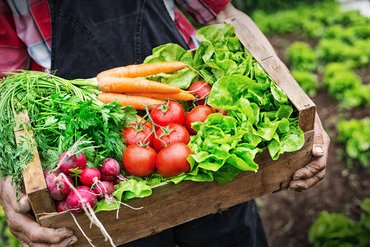Momentum is growing at the farm level for initiatives that seek to tackle food waste, food insecurity, and sustainability, according to a presentation Thursday at the NYC Food Waste Fair.
Farmers need more support for their efforts in the form of increased community awareness around food waste issues and the costs involved in local, sustainable farming, panelists said. That increased awareness in turn could help put pressure on the food processing and distribution industries to support waste reduction at the farm level, they said.
“It’s about supporting local food systems,” said Nicole Baum, director of business development at Gotham Greens, which operates hydroponic greenhouse produce farms in urban areas. “It’s about encouraging consumers to do their homework, and use their dollars to support businesses that are doing good things.”
The panel presentation, called “Farm to Fork: Farming, Food Waste, and Eating Sustainably,” addressed the challenges that local farms face in growing food without waste. As much as 30 percent of the produce grown in the U.S. is lost at the farm level, according to Garrett Broad, an associate professor at Fordham University, who moderated the panel.
This is often because fluctuating prices make it impractical to harvest some crops, said Rhys Williams, executive director of The Good Acre, which works with small farmers—in particular Black, Indigenous, and people of color, or BIPOC-owned farms—in Minnesota to find markets for their produce. Consumer and industry support for higher prices paid to local farmers could help them operate with less waste, he said.
“We try to tell people that it is expensive to farm in Minnesota, and we can’t compete on price,” he said.
The Good Acre is seeking to encourage large food distributors and foodservice operators to support local BIPOC farmers by buying their products, and is hoping that consumers will pressure them to do so.
Local growers and organizations such as The Good Acre were able to respond to increased demand from hunger-relief organizations during the pandemic, however, which helped create demand for their produce, Williams explained. Government agency support for these relief efforts was valuable, he said.
“Everything went quickly, and that eliminated a lot of food waste,” he said. “I feel like money put in the right place can help build local community, and help local farmers survive.”
Baum of Gotham Greens, which donated more than 300,000 pounds of produce to hunger relief organizations last year, said local growers are ideally situated for this type of need.
“Regional food systems in times of crisis are really important,” she said. “They are very nimble, and there’s a lot of opportunity to support the people in the community.”
The Good Acre has also started to see some success finding markets for local produce in local school systems, Williams said.
Another challenge that Minnesota farmers have been seeking to overcome has been the increasing unpredictability of the climate, which can have a devastating impact on small farms. The Good Acre is encouraging its farmers to diversify so they are not dependent on crops that are negatively impacted by excess rain, such as broccoli and cauliflower, for example. They are also working with farmers to add crops such as potatoes that can be cured and stored to yield good financial returns year-round.
Another approach to reducing food waste is through upcycling, said Riyana Razalee, head of business development and strategy at Re-Nuble, which converts organic waste from farms, food processors, and other sources, into nutrient-rich solutions that can be used in hydroponic farming and for other uses. These upcycled nutrients replace the mineral salts that hydroponic growers currently use, which are sourced via mining, and often from China and Russia.
“We need to change the narrative about what food waste is,” Razalee said. “If you change how people think about it, you change what it really means.”
One of the challenges many food processors have faced in reducing food waste is the complexity of state and local composting procedures and requirements. Composting practices vary widely from state to state and among different municipalities and regions within states, making it difficult for some companies that generate food waste to create cost-effective systems for disposing of it.
That’s where Re-Nuble can step in and upcycle some of that food waste, Razalee explained.
At the consumer end of the food chain, Baum of Gotham Greens said there are opportunities to reduce waste by teaching consumers about product freshness, rather than relying on “sell by” or “use by” dates that indicate when food products expire. Although some progress has been made in this area with terminology such as “best if used by” labeling — which is supported by large industry associations, as well as the Food and Drug Administration — there’s still room for improvement, she said.
“There’s a lot of opportunity to educate consumers about what is safe to eat and what is not,” she said, noting that retailers can also end up generating excess waste by adhering to these labels as they are currently used.
Related: Panelists: Education, Funding Needed to Speed Up Food Waste Efforts; ReGrained Receives First Upcycled Food Certification.

